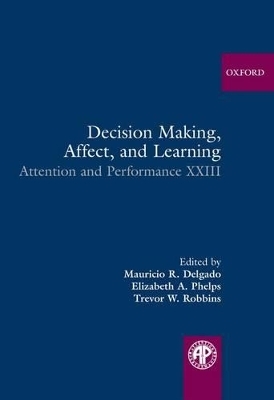
Decision Making, Affect, and Learning
Oxford University Press (Verlag)
978-0-19-960043-4 (ISBN)
This latest volume in the critically acclaimed and highly influential Attention and Performance series focuses on two of the fastest moving research areas in cognitive and affective neuroscience - decision making and emotional processing.
Decision Making, Affect, and Learning investigates the psychological and neural systems underlying decision making, and the relationship with reward, affect, and learning. In addition, it considers neurodevelopmental and clinical aspects of these issues - for example the role of decision making and reward in drug addiction. It also looks at the applied aspects of this knowledge to other disciplines, including the growing field of Neuroeconomics.
After an introductory chapter from the Volume editors, the book is then arranged according to the following themes:
Psychological Processes underlying decision-making.
Neural systems of decision-making
Neural systems of emotion, reward and learning
Neurodevelopmental and clinical aspects
Superbly written and edited, the book highlights the complex interplay between emotional and decision-making processes and their relationship with learning.
Mauricio Delgado is the Principal Investigator of the Social and Affective Neuroscience Lab in the Department of Psychology at Rutgers University. His research program focuses on understanding the behavioral and neural influences that positive and negative reinforcers have on our ability to learn, adapt and make sound choices. The lab uses functional magnetic resonance imaging (fMRI) in conjunction with physiological and behavioral measures to obtain converging information aimed at addressing questions such as: 1) How does the human brain learn about value? 2) How does it use this information to make decisions and guide behavior during (a) basic processes, such as instrumental conditioning (learning a particular choice will lead to a desired outcome) and (b) more complex social interactions which are integral to everyday behavior; 3) How do we control or regulate our expectations and emotional responses to cope with simple and complex decisions? Elizabeth A. Phelps received her PhD from Princeton University in 1989, served on the faculty of Yale University until 1999, and is currently the Silver Professor of Psychology and Neural Science at New York University. Her laboratory has earned widespread acclaim for its groundbreaking research on how the human brain processes emotion, particularly as it relates to learning, memory and decision-making. Dr. Phelps is the recipient of the 21st Century Scientist Award from the James S. McDonnell Foundation and a fellow of the American Association for the Advancement of Science and the Society for Experimental Psychology. She has served on the Board of Directors of the Association for Psychological Science and the Society for Neuroethics, was the President of the Society for Neuroeconomics and is the current editor of the APA journal Emotion. Trevor Robbins was appointed in 1997 as the Professor of Cognitive Neuroscience at the University of Cambridge. He was elected to the Chair of Expt. Psychology (and Head of Department) at Cambridge from October 2002. He is also Director of the newly-established Cambridge MRC Centre in Behavioural and Clinical Neuroscience, the main objective of which is to inter-relate basic and clinical research in Psychiatry and Neurology for such conditions as Parkinson's, Huntington's, and Alzheimer's diseases, frontal lobe injury, schizophrenia, depression, drug addiction and developmental syndromes such as attention deficit/hyperactivity disorder. He is a Fellow of the British Psychological Society, the Academy of Medical Sciences and the Royal Society, the U.K. National Academy of Science. He has been President of the European Behavioural Pharmacology Society (1992-1994) and he won that Society's inaugural Distinguished Scientist Award in 2001.
SECTION 1: PSYCHOLOGICAL PROCESSES UNDERLYING DECISION MAKING; SECTION 2: NEURAL SUSTEMS OF DECISION MAKING; (TUTORIAL REVIEW); SECTION 3: NEURAL SYSTEMS OF EMOTION, REWARD, AND LEARNING; SECTION 4: NEURODEVELOPMENTAL AND CLINICAL ASPECTS
| Reihe/Serie | Attention and Performance Series |
|---|---|
| Verlagsort | Oxford |
| Sprache | englisch |
| Maße | 181 x 247 mm |
| Gewicht | 1172 g |
| Themenwelt | Geisteswissenschaften ► Psychologie ► Allgemeine Psychologie |
| Geisteswissenschaften ► Psychologie ► Biopsychologie / Neurowissenschaften | |
| Geisteswissenschaften ► Psychologie ► Test in der Psychologie | |
| Geisteswissenschaften ► Psychologie ► Verhaltenstherapie | |
| Naturwissenschaften ► Biologie ► Humanbiologie | |
| Naturwissenschaften ► Biologie ► Zoologie | |
| Wirtschaft ► Volkswirtschaftslehre ► Mikroökonomie | |
| ISBN-10 | 0-19-960043-0 / 0199600430 |
| ISBN-13 | 978-0-19-960043-4 / 9780199600434 |
| Zustand | Neuware |
| Haben Sie eine Frage zum Produkt? |
aus dem Bereich


